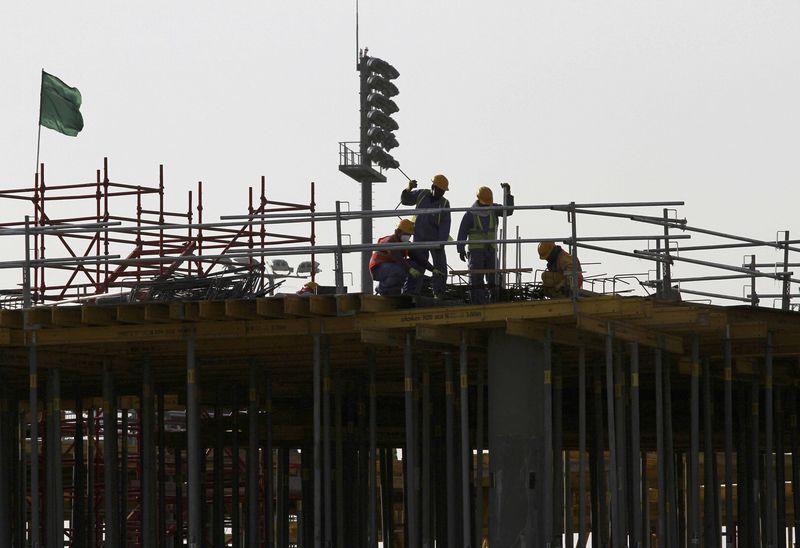By Tom Finn
DOHA (Reuters) - Workers in Qatar renovating a 2022 World Cup stadium have suffered human rights abuses two years after the tournament's organisers drafted worker welfare standards in the wake of criticism, Amnesty International said.
Dozens of construction workers from Nepal and India were charged recruitment fees by agents in their home countries, housed in squalid accommodation and barred from leaving the country by employers in Qatar who confiscated their passports, Amnesty said in a report released on Thursday.
The head of Qatar’s Supreme Committee for Delivery & Legacy, which is responsible for the delivery of all tournament-related infrastructure, said Amnesty had identified challenges in worker conditions and Doha was working to reduce these kinds of abuses which he said occur on construction sites all over the world.
Amnesty said it interviewed 132 workers involved in the rebuilding of the Khalifa stadium, a vast sporting complex in Doha that is part of a $200 billion construction boom in the gas-rich Gulf state that will host a World Cup quarter-final.
The alleged ill treatment of workers on a high-profile project raises questions about recent reforms in the country that has said it will improve foreign workforce conditions.
Hassan Al Thawadi, Qatar's 2022 committee chief, said Amnesty had highlighted "malpractices" faced by some of the 5,100 construction workers building stadiums, a figure set to increase seven-fold to 36,000 in the next two years.
"We've always recognised that we don't have a magic wand that could fix the matter from the very beginning," Thawadi told reporters in Doha on Monday, calling the World Cup a "catalyst for change". "We're resolving gaps day by day."
FIFA UNDER PRESSURE
The Amnesty report pointed to abuses by small sub-contractors brought in to work on Khalifa stadium who do not appear to have been vetted by the tournament's organisers.
The watchdog group said staff from one labour-supply firm threatened to withhold pay and report workers to police to exact labour from migrants ,which the group called "forced labour".
FIFA's new leadership has been under pressure to ensure Qatar delivers better standards for workers before World Cup construction peaks in 2017.
The Swiss-based body said in a statement on Thursday it would urge government authorities in Qatar to take action and ensure newly-drafted labour standards became a benchmark for construction projects in Qatar.
Amnesty's Gulf researcher Mustafa Qadri said Qatar has improved "very visible" aspects of labour conditions like safety and worker accommodation but many "hidden abuses," including threats to workers and failure to honour pay contracts, persist.
"In Qatar the employer still controls the livelihood of a worker in a very expansive way," he said.
Since winning the World Cup in 2010, Qatar has spent tens of billions of dollars on a new port, metro system and airport. Hundreds of thousands of south Asians were recruited and they account for 94 percent of the 2.1 million population.
Following persistent criticism from rights groups of its 'Kefala' sponsorship laws, Qatar last year introduced electronic payment of salaries and created an appeal process for workers if employers do not sanction their leaving the country.
The Kefala system, variants of which are used across the Gulf, binds workers to their employers by requiring them to get permission to change jobs or leave the country.
"EVADING RESPONSIBILITY"
But the reforms could fall short, said Qadri, because of an opaque and lucrative system of chain contracting where multinational firms pass responsibility for worker welfare down to subcontractors.
Seven Nepalese men who worked on Khalifa Stadium for a subcontractor told Amnesty they had wanted to return home to check on their families after the earthquakes that hit Nepal in 2015 but their employer did not allow them to leave.
Another worker said his manager shouted at him and threatened to withhold delayed salary payments after he said he wanted to quit.
Niko, a 32-year-old Nepalese worker pruning plants next to Khalifa stadium on Wednesday, said he had not been mistreated but knew other workers whose passports had been confiscated.

"Qatar is racing ahead and developing very fast and everyone - the government and the companies - should start showing some respect to the ones who are building it."